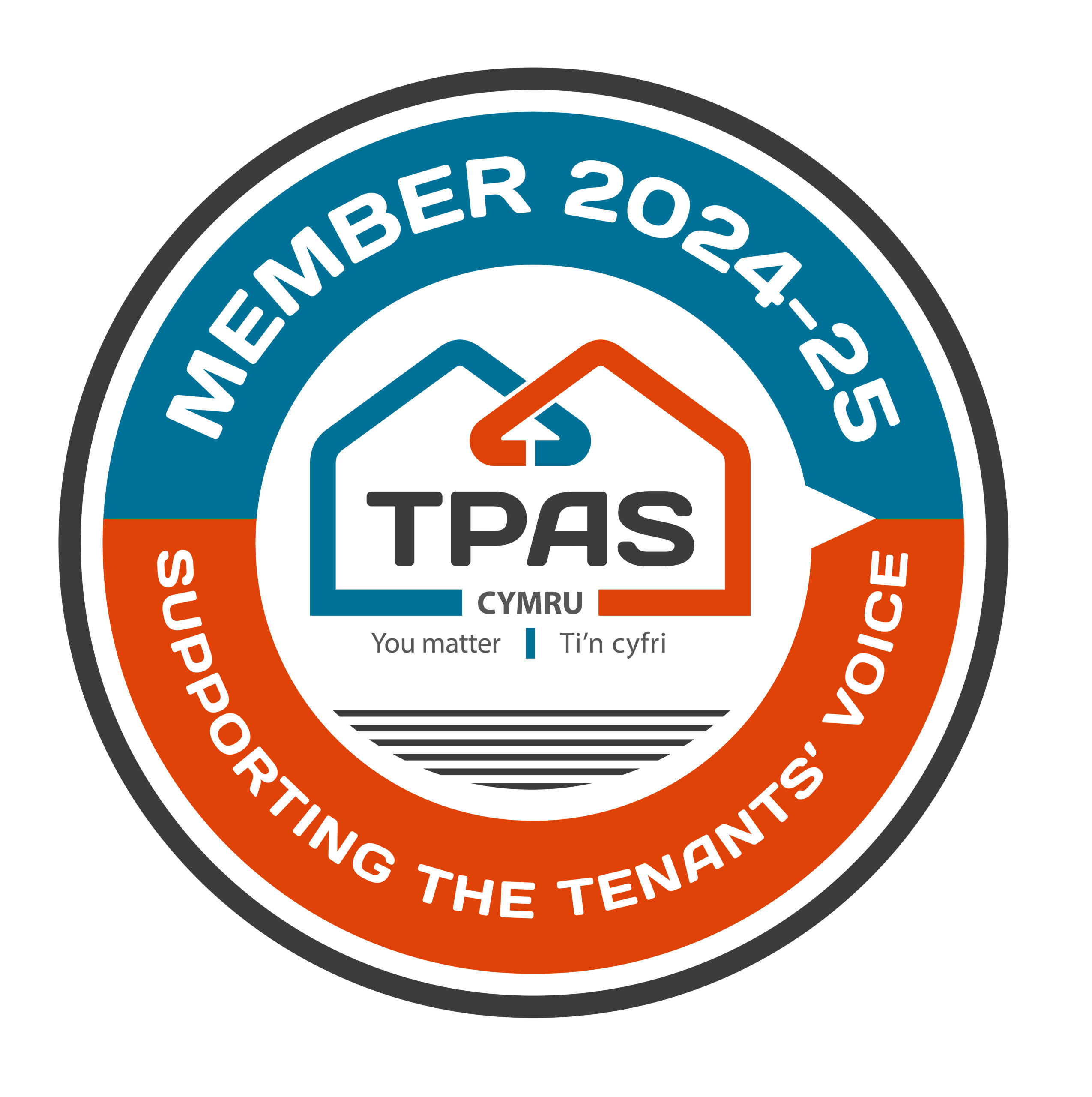What is the difference between social housing and private renting?
Social housing provides affordable housing to families on a low income. Social housing is either owned by a local authority or a Registered Social Landlord (RSL), such as United Welsh. Housing Associations are not-for-profit organisations and invest the money they make from rents into building new homes. In Wales, Social Housing is regulated by the Welsh Government.
The main differences between social housing and private renting are:
• Social housing normally provides an assured tenancy. Unlike a private tenancy, social landlords cannot end the tenancy by giving 30 days notice.
• Rents are strictly controlled. Social landlords generally accept benefit claimants and do not require a bond or security deposit.
• Social housing is allocated on the basis of need – so if you have a large family, you will be given a large home, but if you live alone, you are likely to be given a one-bedroom property.
• Social housing is looked after by the landlord and must meet Welsh Housing Quality Standards (WHQS). This means that routine repairs, servicing and upgrades to kitchens, boilers and so on are carried out by the landlord to a higher standard than most private landlords.
How many bedrooms can I have?
The Spare Room Subsidy, or ‘Bedroom Tax’, means that people under state pension age who receive Housing Benefit will find their payment is reduced by 14% if you have one spare room, and 25% for two or more. Because of this, there have been changes to the way social housing is given out. For more information about this, visit your local authority’s website.
Guidance for children sharing bedrooms
- Children of the same sex under 16 years can share a room
- Children of different sexes under 10 years can share a room
- If you are not planning on applying for housing benefit or you are happy to pay the shortfall, children can still have a room of their own
- We can only offer rooms to children if they live with you permanently.
Bedroom allocation by size of property
| Bedsit / studio flat | Single person |
| 1 bedroom flat, ground floor | Single person or couple, preference given to those with mobility or health issues* |
| 1 bedroom flat, first floor and above | Single person or couple |
| 2 bedroom flat, any floor | Single person or couple downsizing from 3 / 4 / 5 bedroom house
Single person or couple who need a carer to stay overnight* Two adults requiring separate rooms (i.e… not a couple or a couple with medical problems meaning they need to sleep separately* Single person or couple with one child or pregnant* Single person or couple with two children For ground floor flats, we’ll give first refusal to people with mobility issues or children under five years. |
| 2 bedroom house | Single person or couple downsizing from 3 / 4 / 5 bedroom house
Single person or couple who need a carer to stay overnight* Two adults requiring separate rooms (i.e. not a couple or a couple with medical problems meaning they need to sleep separately* Single person or couple with one child or pregnant* Single person or couple with two children |
| 3 bedroom house | Single person or couple with two, three or four children |
| 4 bedroom house | Single person or couple with two, three or four children |
| 5 bedroom house | Single person or couple with four, five, six or seven children |
* Must be evidenced with letter from medical professional.
How long will I have to wait?
This is a really tricky question because it depends on a number of things:
Where you are on the common housing register: Each local council has a common allocation policy and waiting list for all social housing in that area. All lists prioritise people in the most need (i.e. unintentionally homeless, fleeing abuse, or those with a property that is seriously unsuitable due to a physical disability or serious disrepair).
Applicants with little or no housing need have lower priority. Transfer applicants who already live in social housing are also given less preference because they have an advantage over those in private rental accommodation.
Some common housing registers work on “points”, which are assigned based on the level of need and length of time registered. Some work on a “choice based” basis. This means vacant properties are advertised and applicants will need to check adverts and bids to be considered.
Caerphilly Borough and Cardiff work on a banding system. Those with the highest need are placed in the top bands. An applicant’s position in the band normally depends on how long they have been registered.
Some councils also consider local connection and give a level of preference to people who live and work in the area.
You can usually find out more about waiting times and how properties are allocated in each area on the local council housing website.
The area you want: Larger towns like Caerphilly are in higher demand than smaller places further up the Valley. The more areas you are willing to consider, the more options you will have. We may also have more properties in some areas than others. If you are looking for a very specific area, you may have a long wait before any properties become vacant
The type or size of property you need: Larger properties (three bedrooms plus) become vacant less often because families tend to grow. There are also fewer four or five bedroom properties built as standard. The largest properties we own in Caerphilly Borough are four bedroom / seven person homes. Bungalows are in high demand amongst our elderly and disabled applicants. There are not many of them and they do not become vacant often. If you need this type of home we suggest you consider ground floor flats or having your current home adapted to suit your needs.
If your application is up to date: It’s important to let your council know if your circumstances change, particularly if you move to another address or change your email address or phone number. If the makeup of your household changes (e.g. if you have a baby or someone moves out), please tell the council so they can make sure you are registered for the correct type of property. If you need a different type of property, such as adapted or ground floor accommodation or if you’re looking for a different area, make sure the council know so they can put you forward for the right property.
Remember if we can’t contact you to make an offer, this may affect your place on the waiting list. Most common housing policies will suspend an application if the applicant is not actively seeking accommodation or fails to respond to a review. Applications may also be suspended if you owe rent arrears or there are grounds for exclusion (e.g. anti-social behaviour issues).
I’ve heard that you’re building new properties in my area. How can I apply for one of them?
We get a lot of interest in our latest developments. Generally the decision about how new build properties will be allocated is made when they are almost complete. Some properties may be designated for sale as part of our Low Cost Home Ownership scheme harmoni homes, while others will be available for rent. Sometimes there is a local lettings policy in place which means these properties must be used to provide a specific kind of accommodation, such as supported housing or sheltered accommodation for older people.
Please be aware that you are unlikely to be able to apply for new build properties only. Most Common Housing Registers managed by the council will ask you to specify what area you want to live in and you will be considered for all properties in that area.
What happens when I’m offered a property?
When we have a vacant property, we will access the local Common Housing Register to get a shortlist of applicants who are suitable for the property. We may do this by asking the council to provide a shortlist (often called “nomination”).
The shortlist will contain applicants who are at the top of the list because of their level of need or because they have been waiting the longest. This depends on the local common allocation policy. We cannot influence the shortlist by asking the council to nominate someone to us.
Our team will contact the applicant at the top of the list by phone, email or letter to make a provisional offer. If the applicant confirms they want the property, the officer will carry out pre-tenancy checks which include:
• A financial assessment with our Money Advisors to ensure the applicant can afford the property.
• Previous landlord references
• ID and proof of residence
• Criminal records and other exclusions.
These checks may take some time to complete. If the applicant passes these checks, they will be made a formal offer of the property. We will confirm with our repair team at Celtic Horizons that the property is ready to let. Once this is done, the applicant will be given a viewing date and / or sign-up date to get the keys!







